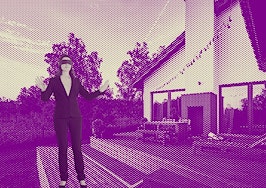During this period of quarantine, everyone in our industry had to learn to use new muscles. We’ve had to learn how to accomplish much of our work in new ways, using different tools.
When the world reopens, there are many old ways we’ll readily and eagerly return to. But some of those new habits and tools are going to stick around for good. This has a number of positive implications for us all. One of the biggest perks is that now, we’ll all work with enhanced efficiency and effectiveness.
We’ll all be better agents for having endured this challenging period. So, when the storm clouds clear away, what will stay and what will go? Let’s start with the keepers.
1. Brick-and-mortar businesses
We’ve all been hearing for years about the demise of brick-and-mortar businesses. And the need for the physical office has certainly evolved, and in some ways, diminished. One thing this quarantine has done, however, is show us some of the ways in which a traditional workspace remains irreplaceable.
In many ways, work is a communal activity. This is, without a doubt, especially true in service and sales industries, where almost everyone you encounter is a “people person.”
What we’ve discovered over the years in our office is that even in real estate, which is structured very much as an individualistic business, people still crave collaboration. People still work better together than alone.
Here’s one of many reasons for that. There are three basic ways we learn: through formal training, informal training and experience. A great deal of our informal training takes the form of osmosis, where we absorb new, better ways of performing simply by being around other high-performing people and seeing them at work.
I’m sure there are people who have been able to get off to a successful start in this business, and then nourish their growth as a successful veteran, in isolation. But there can’t be very many of them. The value of working with and around one another remains immense.
2. Client meetings
A house is a decidedly physical thing. So, while videos, virtual tours and professional photography are great, there’s still no real replacement for the in-house listing appointment.
It’s not just about the fact that agents need to tour the home to understand how to market it effectively. It’s also about that face-to-face communication. Agents need to sit in-person with potential clients to effectively communicate their value, set expectations and nurture the kind of trust necessary to becoming a persuasive advisor throughout the transaction.
Video conferencing is an excellent tool — for certain uses. What it’s not good at is carrying on a conventional conversation, including all the information we both send and receive nonverbally. Too much of that information gets lost in a virtual listing appointment.
The same holds true for buyer consults. Almost without exception, those who begin their agent-buyer relationship with a full sit-down discussion of their role, the buying process and their expectations of the buyer, will be more successful. And again, video doesn’t come close to replacing a face-to-face meeting.
3. Small group meetings and sales meetings
I’ve been having my usual training sessions with our new agents via video. And while it’s much better than nothing, it’s an extremely limiting format — and somewhat of a frustrating one at that.
One thing it lacks is that “osmosis” element that you get when a group of people sit around a table and share experiences.
It also isn’t really designed for two-way conversations. Instead of seeing cues when people want to interject with a comment or question, we all just have to interrupt one another. I know there are questions rising in people’s minds that aren’t being asked because of this awkwardness.
Breaking bread is important for an office’s culture, too. When we all gather in the same room every other Tuesday morning for sales meetings, grab a bagel or a doughnut and chat while waiting for the meeting to begin, we’re experiencing a profoundly deeper connection with our colleagues than when we open our laptops at our kitchen table to join a video meeting. (And let’s face it, most of the time, we don’t even know who’s attending.)
So, broadly speaking, what kinds of ways will we immediately return to, as soon as we can? Those that bring us physically together, when that togetherness simply can’t be replaced through any kind of technology.
4. Communication channels that enhance, rather than diminish, our connectedness
Now that I’ve been knocking it a bit, let’s praise videoconferencing for what it does accomplish. It provides an intermediate mode of communication between the phone call and the in-person meeting.
While it has been available for quite some time, its usage has increased dramatically these last few months. So much so that even the most tech-challenged among us have, through necessity, learned to use it.
Yes, compared to face-to-face meetings, videoconferencing is a diminished communication channel. But compared to the phone call, it can be an enhanced one. In addition to seeing people’s faces, we can show slides, and the meeting moderators or trainers can share their active screens.
There are other means of communicating that will stick around. In our office, we’ve used Slack with the staff for years. But being compelled to work from home, our use of it has blown up — so much so that, in some ways, we’re communicating now more (and better) from separate quarters than we did when we were housed in the office together.
A lot of people discovered the value of Slack and other messaging and communication apps like Hive, Google Hangouts and Chanty during this time of quarantine. These kinds of tools aren’t going away.
5. Electronic transfers of funds
Nearly all of the holdouts on automatic deposit of paychecks have given in — and they’re happy they did. Driving earnest money checks around town has finally gone the way of the dodo (as it should have years ago).
With staff working from home, I’ve been responsible for checking the courier each day at the office. What I’ve found is that 90 percent of what comes and goes are checks, including returned earnest money checks on fallen deals. All of this movement of funds can, and soon will, be accomplished electronically.
As an adjunct to this, all use of paper will now be reduced to only its most irreplaceable uses. Those who have resisted going paperless have now had to learn — to their profit — how to do without.
6. Germ consciousness
Don’t laugh! I’ve never been a germaphobe, and I know lots of others who aren’t germaphobes. We’ve all been agreeing that things will never be quite the same. Every one of our workplaces will function differently on a permanent basis.
We’ll get past social distancing to shake hands and hug one another again. But the new normal will include constant hand-washing, hand sanitizers, wipes for communal computer keyboards and phones, and all the rest of the measures that have become second nature to us.
A little bit of old school, and a little bit of new
Every change brings opportunity. This very unusual period in our lives, but try to leverage what you’ve learned these past months. Apply it purposefully.
As things slowly phase back to normal, we’ll all have a greater appreciation of what we’ve been missing. But the smart ones among us will never go back to “business as usual.” They will use the best of what we had, meshed together with the best of our new normal — and they’ll become the most effective real estate agents you’ve ever seen.
Brian Walker manages a top producing Indianapolis branch office for Indiana’s largest independent real estate firm, the F. C. Tucker Company. He’s been in the business since 1995, and resides with his wife and daughter in Carmel, Indiana.
After 25 years, Inman Connect is coming to you. We’re transcending our legendary events in a live digital event, Inman Connect Now. Get ready for the top industry leaders plotting the path forward, new business ideas and opportunities, networking like you’ve never imagined it, and tons of exciting new magic, all straight to you. It’s all part of an epic new Inman experience, Connect Now, June 2-4, 2020. Click here to save your seat.













